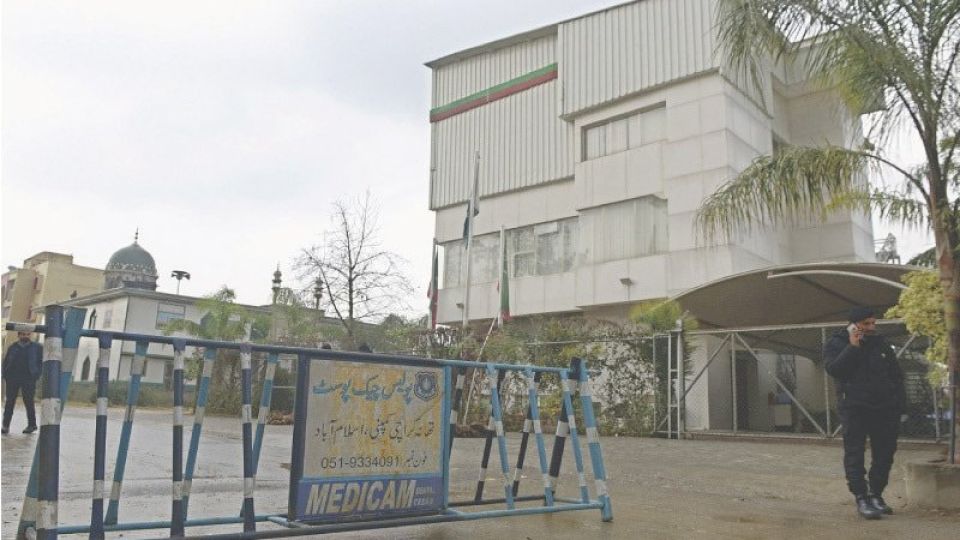February 1, 2024
ISLAMABAD – Just before a PTI’s general body meeting on Wednesday, police and security officials in plainclothes allegedly raided and took control of PTI’s central secretariat in Islamabad’s Sector G-8, stopped members from entering the premises, warning them that they would have to face consequences, party sources said.
The PTI general body, however, managed to hold a virtual meeting in which it decided to hold intra-party elections within a fortnight.
An official of the capital police denied the allegation, pointing out that a raid could not be conducted without having its permission from a magistrate and no such order was issued on Wednesday.
He claimed on condition of anonymity they went there for security. “[As] a judgement against Imran Khan and Bushra Bibi was announced, there was a possibility that a protest would be held there. Police did not enter the secretariat and remained outside.”
At the online meeting, the PTI general body nominated Omar Ayub as chief organiser and empowered him to issue notifications for intra-party polls. It also nominated new election commission, headed by Raoof Hasan as chief election commissioner, with one member from each province and Gilgit Baltistan.
Noorul Haq from Sindh, Qazi Mohammad Anwer from KP, Walid Iqbal from Punjab, Mohammad Daud Khan from Balochistan and Nasir Shah from GB have been nominated as members of the election commission from their respective provinces.
Official claims police reached party’s central secretariat for ‘security’; PTI to hold intra-party polls within a fortnight
A party representative, requesting anonymity, said the general body meeting was planned to be held in Islamabad, all provincial capitals and GB for which an arrangement was made to connect all stations through internet.
“However, in Islamabad, police along with people in civil dress reached the central secretariat, removed guards and took control of the secretariat. Staff was told to go out and a few of them, who wished to stay there, were restricted to their offices. Police officials threatened the PTI members, who were reaching there to attend the general body meeting, and told them not to take part in any political activity if they don’t want to face consequences,” he said. “Later, members attended the meeting virtually.”
A ‘crackdown’ similar to the one in Islamabad was launched against the party in Quetta but the members swiftly changed venue of the meeting and managed to attend it physically, according to him.
The meeting was convened by Sibghatullah Virk in Islamabad, Sher Ali Arbab in KP, Ijaz Minhas in Punjab, Khurram Sher Zaman in Sindh and Salar Kakar in Balochistan, he said. The general body decided that the PTI would hold polls to the satisfaction of the ECP and that Imran Khan would remain party’s chairman-for-life.
Imran’s nomination papers
Also on Wednesday, the apex court offices returned Mr Khan’s challenges to the rejection of his nomination papers for Mianwali (NA-89) and Lahore (NA-122) seats, with a direction to remove the deficiencies in the petitions and resubmit them within a fortnight.
Soon after his conviction in the Toshakhana and cipher cases, Mr Khan approached the Supreme Court through Advocate Uzair Karamat Bhandari to seek a direction that he was entitled to get election symbols besides his candidature should be included in the list of validly nominated aspirants from Mianwali and Lahore constituencies to contest the Feb 8 elections.
While returning the petitions, the court office pointed out that the case description was improper, the petitions lack mentioning of actual controversies, chronology of litigations, findings recorded by the forums below and the questions requiring consideration by the SC.
Mr Khan’s nomination papers were rejected by the returning officer on the grounds that he was disqualified from contesting polls due to Toshakhana charges and for defaulting on a Rs3.6 million payment of social security. The Lahore High Court also upheld the tribunal’s decision, validating the rejection of papers.
The petitions contended the forums below based their decision on the Toshakhana case, finding that such conviction disqualified the petitioner under Article 63(1h) of the Constitution. The rejection was wrong and irrational as the said article did not simply require conviction but conviction for an offence involving ‘moral turpitude’, the pleas argued, highlighting that this was a ‘significant omission’.
Pemra ordered to facilitate PTI
On the other hand, the Lahore High Court, in a detailed verdict issued on a petition of Mr Khan, directed Pakistan Electronic Media Regulatory Authority (Pemra) to ensure that the PTI founding chairman as well as candidates of all political parties are given free access to media platforms in view of the upcoming general elections.
“The government has no right to prevent the media from covering certain candidates or political parties. Similarly, the media platforms must be able to provide unconstrained access to candidates belonging to all political parties to transmit their opinions and manifestos to the public enabling them to make informed choices,” Justice Shams Mahmood Mirza ruled.
The judge disposed of the petition on Jan 4 after Pemra’s counsel claimed that the authority had not issued any instructions to TV channels about any restriction on Mr Khan’s media coverage.
In the detailed ruling, Justice Mirza said free and fair polls required an opportunity for all candidates and their supporters to promote their respective manifesto, to have access to and hold meetings at the venue of their choice and to travel freely across the country.
A free and fair election required freedom of speech, assembly, movement, information through an independent media, he noted, adding that “without these freedoms, no election can be called free, fair and democratic”.
The LHC asked Pemra to ensure that the petitioner and candidates of all parties are given unrestricted access to media platforms.


